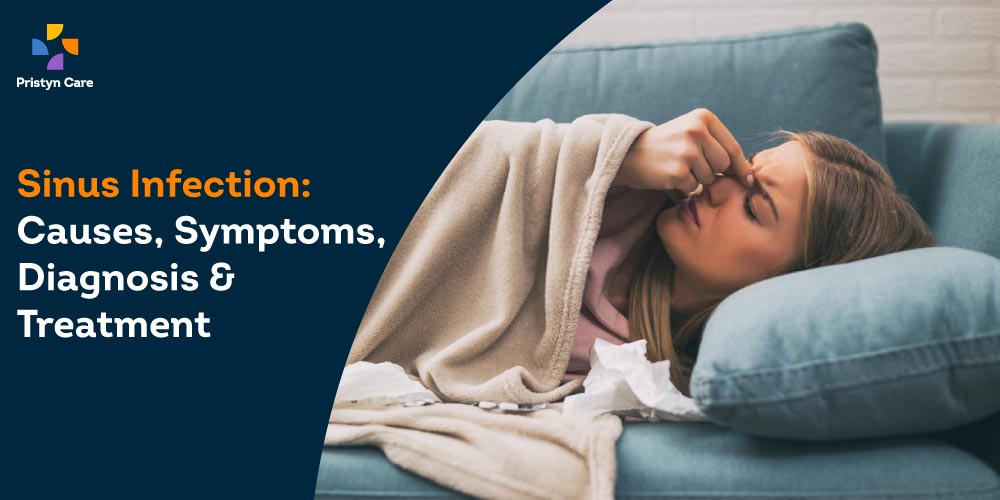Symptoms and treatment of sinus infections

A sinus infection usually occurs when the nasal passages become infected, swollen, and inflamed. Also known as sinusitis or rhinosinusitis. It can occur when fluid builds up in the sinuses, allowing bacteria and other organisms to grow. It is usually caused by a virus and often persists after other upper respiratory symptoms have disappeared. In some cases, bacteria and fungi can cause sinusitis.
Treatment options for sinusitis depend on the severity of symptoms.
Symptoms of sinus infection
Common symptoms of sinusitis include:
- Nasal congestion: A feeling of blockage can be caused by swelling of the sinuses or nasal passages. A stuffy nose can make it difficult to perceive smells and tastes.
- Sinus Headache: Swollen sinuses with constant pressure can cause headaches. After lying down and moving your head, the change in air pressure can exacerbate the symptoms.
- Kindness in the face: This is a common symptom of sinusitis. Tenderness on the bridge of the nose, under the eyes, forehead, and cheeks.
- Runny nose and postnasal drip: If you blow your nose frequently, the discharge may be yellow, green, cloudy, or pink with blood.
- Emission: A runny nose is a common symptom of sinusitis. It can also cause coughing, hoarseness, tickling, and sore throats at night and after waking up in the morning.
- Sore Throat and Cough: Postnasal drip can cause inflammation and cause persistent coughing. Getting out of bed or lying down may make symptoms worse. Sleep may become difficult.
- Sore Throat and Hoarseness: Dripping mucus can irritate the throat and cause sore throats and hoarseness. Frequent coughing and clearing may worsen symptoms.
- heat: Rarely, sinusitis can also cause a low-grade fever (100.4 to 103°F).
- Halitosis (Halitosis): Infected sinuses can also cause foul-smelling mucus to drip down the throat and into the mouth.
Treating sinus infections
Treatment of sinusitis depends on the severity of the symptoms. Common treatments for sinusitis include:
Over-the-counter (OTC)
Health care providers usually suggest nasal decongestant sprays such as oxymetazoline for short-term relief of sinus infection symptoms. Doctors usually recommend using her three days at a time. Long-term use of these drugs may worsen symptoms. Nasal congestion symptoms can be relieved with nasal steroid sprays such as fluticasone (Fronase) and triamcinolone without the risk of rebound symptoms with long-term use. For allergies, over-the-counter antihistamines and decongestants may help sinusitis. Common choices include sudafed, cetirizine (Zyrtec), fexofenadine (Allegra), and loratadine (Claritin).
Avoid using decongestants if you have prostate problems, high blood pressure, glaucoma, or trouble sleeping. You should talk to your health care provider to understand the best options for you.
nasal wash
Nasal irrigation involves flushing the nostrils. It is useful if you have chronic sinusitis or other types of sinus infections. Practice flushing your nasal passages with saline to remove mucus and wash away debris and allergens.
Functional Endoscopic Sinus Surgery (FESS)
Health care providers usually recommend functional endoscopic sinus surgery (FESS) in severe cases. It is a minimally invasive surgery. During surgery, doctors use nasal endoscopes (thin tubes with lights and lenses) to relieve sinus symptoms without making incisions in or around the nose.
Causes of sinus infections
Some common risk factors for sinus infections are:
- nasal allergy
- Cystic fibrosis, which causes mucus buildup in the lungs
- exposure to mold
- dental infection
- smoking
- Environmental pollution
- swelling or growth in the nose
- nasal polyps
- have a weak immune system
- allergy history
- Respiratory tract infections caused by bacteria, fungi, or viruses
- deviated septum
When should I consult a doctor?
If your symptoms do not improve after a week of treatment with decongestants or over-the-counter cold remedies, you should see your doctor. See your healthcare provider as soon as possible if you have any of the following signs that indicate a severe sinus infection:
- swelling of the forehead
- blurred vision
- Mucus dripping down the throat (postnasal drip)
- facial pain and pressure
- neck stiffness
- confusion
- redness around the eyes
- heat
- sinus headache
If you experience any of the following symptoms, you should seek immediate medical attention to avoid possible complications:
Questions to ask your doctor
Before treating a sinus infection, you should ask your healthcare provider the following questions to understand your treatment options and the associated risks and complications:
- What are the treatments for sinusitis?
- Can sinusitis be cured naturally?
- What foods should I eat to treat sinusitis?
- Can sinusitis be treated at home?
- What is the best medicine for sinusitis?
- What Indian herbs are good for sinusitis?
- How long does sinusitis last?
- Is sinusitis a serious problem?
- How can I get rid of sinusitis permanently?
- What is sinusitis?
- Which fruit is good for sinusitis?
- What happens if sinusitis is left untreated?
- What are the main causes of sinusitis?
- What are the complications of sinusitis?
How can I prevent sinus infections?
Here are some steps you can take to prevent possible sinusitis.
- Avoid smoking as it increases the chance of sinusitis.
- Wash your hands properly, especially during cold and flu season.
- Regular health check-ups to diagnose and treat allergies.
- Try to avoid pollutants such as secondhand smoke and chemicals.
- Keep your nose moist with saline.
- Avoid steroids and antibiotics, as they can interfere with the natural good bacteria that live in your sinuses and encourage the growth of bad bacteria.
- Other illnesses such as the flu and viral colds can cause sinusitis, so try to maintain a healthy lifestyle to boost your immune system.
Conclusion
In conclusion, identifying symptoms of sinusitis is essential for prompt treatment. If you notice persistent facial pain, nasal congestion, runny nose, or headaches, consult your healthcare provider for accurate diagnosis and effective treatment to relieve your symptoms and speed up your recovery. It is recommended.
https://www.pristyncare.com/blog/sinus-infection-symptoms-treatment/ Symptoms and treatment of sinus infections



